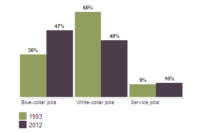'Get there at 4 a.m., Get work'
Finally, there is the unpaid wait time. To work at Ty, Castro must report in the alley no later than 4:30 a.m. In fact, many workers arrive earlier. "If you get there at 4 a.m., you get work," said a tamale vendor whose food cart steamed against the cold one January morning. "If you come at 4:20, there's no work for you."
At Ty's warehouse, every identifying aspect, from the official labor notices to the punch clock, said Select Remedy — not Ty. There was not even a name on the warehouse.
When workers arrived at 5:35, a Select Remedy employee made sure they signed in. But they had to wait another 20 minutes in the cafeteria before they could start getting paid.
Next to the punch clock was a sign that read in Spanish, "Please do not punch in until 5:55 a.m. This measure will be strictly enforced, and measures will be taken with employees that don't follow the rule."
Castro's pay after the hour and a half of waiting was factored in: $5.98 an hour.
Select Remedy said it can't control whether workers arrive early.
Leone Bicchieri, executive director of the Chicago Workers' Collaborative, has been struggling with how to fix what he sees as an effort by big businesses like Select and Ty to pass costs on to the workers.
A solution, Bicchieri suggested, would be for the temp agencies to make the raiteros official agents and offer transportation for free or at a minimal cost.
"We don't have any problem with this whole system becoming much more public and transparent," Bicchieri said. "We have always had a problem with them being forced to get on the van or workers getting a preference if they take the van."
Sitting in his home wearing a Select Remedy T-shirt, Aguilar said being a raitero provides a better life than when he worked as a temp in factories, but after paying for gas and maintenance, it's not much more money. Indeed, he rents an apartment not much bigger than what the workers have, with peeling paint and mold in the bathroom. A few Chinese prints of butterflies and orchids hang above his couch.
His son, Victor, sitting next to him on the couch, grew angry as he reflected on how the temp agency deals with his father.
"They don't want to pay him," Victor said. "They have all the people come here. They don't care. Screw you. You take the people. You give them the ride and you charge the fee. We don't want to have anything to do with you."
Marketplace reporter Jeff Tyler[8] contributed to this report.





